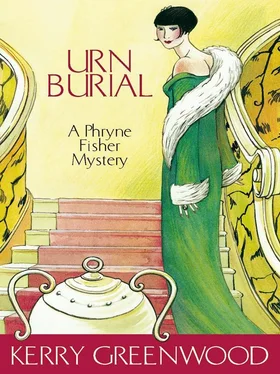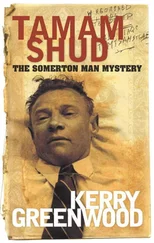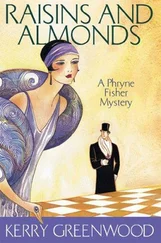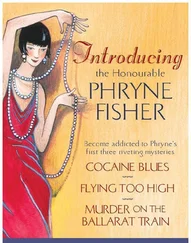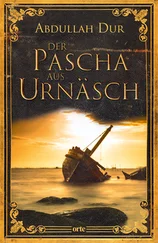‘Why have you allowed that man to keep such a secret?’ worried Lin. ‘Shouldn’t you tell Mr Reynolds that his life is in danger?’
‘I think he knows, Lin dear. I think he already knows.’
Phryne had disrobed and soaked in a very hot bath, and was lying on her bed being anointed with goanna oil by a worried Dot when Mrs Reynolds knocked and was admitted.
‘Phryne, you’ve been thrown! Terry Willis told me that Cuba threw you. Are you all right?’
‘Just a few bruises. I landed rather awkwardly,’ said Phryne, pleased that one part of the statement was true.
‘I knew that horse was unsafe – I don’t know what Tom was thinking of, buying a retired racehorse. I will have the creature shot.’
‘Sit down, Evelyn,’ requested Phryne, who was getting a crick in her neck trying to look up into her hostess’s face. She could not allow Cuba to be executed. ‘It wasn’t the horse. Someone set a snare. A tarred wire across the road, just at knee height for poor Cuba. Evelyn, you wouldn’t like to let me know what is going on, would you? I am a private investigator by profession.’
‘I thought it was the horse,’ said Evelyn. ‘Willis told me that you were an all-right rider – that’s a great compliment from him. Oh, God, and Tom rides every morning, along that bridle path. It was just pure luck that he didn’t ride today, being up so late last night. It should have been him, and he wouldn’t have just got a few bruises, would he?’
‘No, he might have broken his neck,’ said Phryne brutally. She allowed Dot to drape her in a loose gown and reclined on her pillows. ‘Thanks, Dot, that feels divine. Slip down and get me a half bot of champagne, will you? I need a pick-me-up. Now, Evelyn, what is going on? I hear a shotgun blast in the mist, I rescue a parlourmaid who is scared out of whatever wits she had originally, and the next morning someone tries to kill me – or rather, Tom. When informed, Tom makes a joke of the whole thing and declines to take any of it seriously. Your maid was nearly raped and your husband was nearly killed – are you going to tell me about it?’
Mrs Reynolds flinched at Phryne’s plain speaking. ‘Oh, Phryne – ’ she began, then stopped Dot at the door. ‘Could you tell Hinchcliff to make it a full bottle of champagne. And two glasses.’
‘Veuve Cliquot, if there’s any in the cellar,’ added Phryne. ‘Come along, Evelyn, tell me all.’
‘I . . . don’t know where to start. I married Tom when we were both of a good age. I had been married before, I was a widow. I . . . had no children.’
Phryne noted the hesitation and said nothing.
‘My family came out from home about one hundred and fifty years ago. They were squatters. We own a lot of land around here, even the grounds of Cave House used to belong to my grandfather. But we fell on hard times, you see, and there were only daughters in my family, no sons to carry on the name.’ There Mrs Reynolds stuck.
Phryne said softly, hoping that Dot would arrive with the champagne soon, ‘I do understand, you know. Until a lot of young men were killed in the War, I was living in desperate poverty. The Fisher fortunes were only rescued by marrying money – luckily Grandfather did.’
‘Yes. That’s what I did. I married a man much older than me, a manufacturer. Shoes. He lived in the city during the week but came home on weekends – and I did my part, I kept his house just as he wanted it. He paid off all the loans and mortgages, and when he died I married Tom. I married the first time out of familial duty. I married the second time out of love. Can you understand that?’
‘Certainly,’ murmured Phryne, shifting on her pillows and trying to find an unbruised hip to lean on.
‘We came to live here most of the year. We don’t like the city. After the War, things seem to have gone downhill – no one cares anymore for honour or stability or Empire. The music is discordant and the dancing is all ugly acrobatics. Yet manners are the only thing that keep us from anarchy. So I try to keep up propriety, you see, and order and precedence and dignity. Those things matter to me, matter very much.’
‘How you must dislike having a raffish guest like me foisted on you – and bringing an unacceptable lover, as well!’ mused Phryne. Mrs Reynolds flushed.
‘Perhaps, at first, but your Mr Lin is so civilised, so polished, really, you wouldn’t know he was Chinese at all!’
‘Indeed,’ said Phryne dryly. Dot entered with the Butler, who was carrying a silver tray on which reposed a bottle of Moët, two glasses in the highest state of polish, and a plate of dry salted biscuits.
Phryne was impressed. Far from being embarrassed at being in a bedroom with a lady in a state of undress, he was self-assured and dignified. He removed the foil and the wire basket, pulled out the cork with never a pop, and poured the sparkling wine with immense aplomb. He was a tall, stout man, with a magnificent corporation beneath his golden watchchain, and his linen was so white that it was giving Phryne eyestrain. His hair was grey and his hands, as they offered the tray, perfectly steady.
Phryne sipped. A good wine, though not the best. The butler put down the tray and left. Dot shut the door.
Mrs Reynolds gulped her wine with scant respect and Dot poured her another glass. There was a silence which stretched and thinned and Phryne did not break it.
‘There have been letters,’ said Evelyn, approaching the point at last.
‘Letters? To Tom?’
‘Yes. Five. I have them here.’
Phryne sat up too quickly, suppressed an oath, and scanned the papers.
‘Have a look, Dot. See what you make of them. Written in blue pencil, no, indelible pencil, in printer’s capitals. Are they in order of receipt? This is the first, then. YOU BARSTAD YOU CHEAT YOU SWINDLER YOU STOLE MY MONEY YOU LECHER YOU . . . My, a fine flow of invective. Second letter, same words, different order. Third letter – aha! The threat. YOU BARSTAD YOU DISERV TO DIE and the last, YOU BARSTAD ILE KILL YOU. Clear enough as to intention, sketchy as to execution.’
‘This came yesterday,’ said Mrs Reynolds, handing it over.
YOU DIE TODAY YOU SWINDLER, Phryne read. ‘Same indelible pencil, same paper – what do you think, Dot?’
‘Cheap,’ said Dot critically, rubbing it between finger and thumb. ‘But not real cheap. Not Woolworth’s. No lines and foolscap size. I reckon it’s typewriter paper, Miss. Same with the envelopes. Offices use long envelopes like that.’
‘Thank you, Watson, what would I do without you? Go on, Evelyn. Now, you have a suspect, don’t you?’
‘Yes, so to speak, but I . . . can’t believe it of him.’
‘Who? Dingo Harry?’ said Phryne, deliberately breaking her agreement with the stableman. This was more serious than it had first appeared.
Mrs Reynolds was taken aback. ‘How on earth did you know about Dingo Harry?’
‘I have my methods,’ said Phryne, sipping Moët. ‘You think he sent these missives?’
‘He might have. He and Tom had a terrible fight about him slipping through our fences and snaring dingoes on our grounds. I don’t know why it upset Tom so much but it did. He bellowed at Harry and Harry bellowed back and it almost came to blows.’
‘Leaving aside the unlikelihood of a swaggie getting hold of typing paper, why should he call Tom a cheat and a swindler?’
‘No reason. It’s not Dingo Harry I’m thinking of, though he seems most likely for the snare. In fact I wish it was Dingo Harry; he’s a madman and they’d just lock him up for life. He doesn’t matter. It’s Jack, you see. Jack Lucas.’ Evelyn wrung her hands.
‘The tall blond boy? Why should he call Tom a cheat?’
‘Jack Lucas’s father and Tom were partners in a business. Tom got out before old Mr Lucas put all his money into the Megatherium Trust. It crashed and Lucas was ruined – went into a decline and finally put a bullet through his head. It was terrible, such a scandal, you must remember it. His wife died of grief and everything was sold up and poor Jack, who’s been to a good school and educated to go to the university, has to get a job as an auction clerk and he’s awfully unhappy about it. And the really terrible thing about it was that he asked Tom for a loan, to put him through university and pay his fees and so on, promising faithfully to pay him back, and Tom refused. He lost his temper, poor silly man, you know how men are. He said something about like father, like son, and that he wasn’t a safe investment. Then Jack said that all Tom had done in his life was produce second-rate books and the only wisdom he’d shown was in marrying a rich wife. Oh, dear, there was a dreadful row and it took me days to talk them around. But Tom still won’t lend Jack the money.’
Читать дальше
